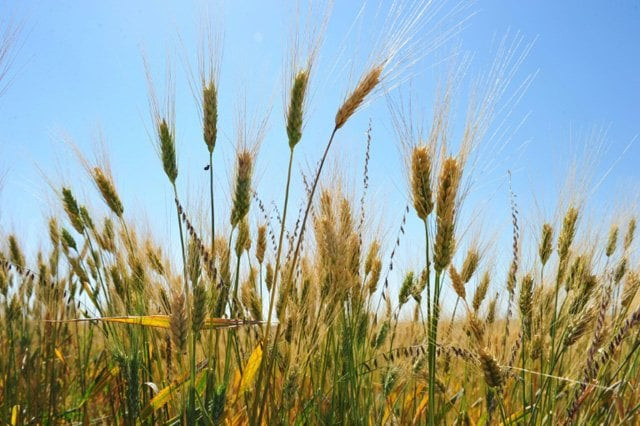Agricultural challenges: Declining soil fertility threatens crop production
Insufficient use of fertilisers over a long period has depleted the land of its natural organic matter

PHOTO: AFP
Per the survey, the soil has become extremely deficient in potassium and other minerals because of which the productivity of crops is not increasing.
A laboratory testing of two million terrestrial samples collected from throughout the province has proved that nitrogen levels in the soil have gone down to 98%, phosphorus deficiency has touched 90%, deficiency of potassium has reached 53% while zinc levels have gone down to 70%. Moreover, out of one million agricultural tube wells surveyed, water from 66% of them was found to be unfit for agricultural use.
Considering the seriousness of the matter, the provincial government has ordered the agricultural department to conduct a “soil series survey.” Soil series refers to a group of soils with similar profiles developed from similar parent materials under comparable climatic and vegetational conditions.
Locusts head back after destroying crops
Punjab was divided into 105 series in the survey conducted in 1972. Per a survey conducted in 2018, the number of soil series had reached 800. Owing to the growing deficiency of organic compounds, it is expected that the number of series will exceed 1,000 under the current conditions.
The Punjab agricultural department has built a website, to be launched within the next few days, pertaining to the organic audit of the underground land in the province. Every agriculturist in the province will have access to details related to the use of proposed fertilisers and crops and the condition of organic underground matter.
During the zoning conducted in Punjab after 40 years, the agriculture ecological zones of the province have increased from eight to 13. A strong recommendation has also been made to stop sugarcane cultivation in the cotton area and to limit rice cultivation in the middle area between Mandi Bahauddin and Nankana.
The Punjab agricultural department’s soil and water testing examined soils of lands owned by the farmers as well as the government. In total, 2.8 million samples will be collected out of which two million samples have already been obtained and sent to the lab for testing. Results showed that organic matter in the lands of Punjab was 0.75 in 2000 which has now reached 0.60. Phosphorus has reduced from 9.85 to 8.6 peat mineral soil mix (PMM), while the average quantity of potassium has dropped from 236 PPM to 90 PPM.
Agriculture experts say that over the past century, farmers did not use fertilisers in adequate quantities for the cultivation of crops because of which the natural organic matter in the land had been used for increasing the productivity of crops and the reserves have been hit by mining.
All governments initiated projects for increasing agricultural production without looking for a long-term solution. For instance, there have been talks about increasing the production of wheat on average by 30 tons per acre. The latest scientific research, however, has proved that by using two sacks of urea, a sack of diammonium phosphate (DAP) and a sack of potash on one-acre land can yield up to 45 tons of wheat per acre. Since potash and DAP are costly fertilisers, costing up to Rs 23,000 per sack, most farmers are unable to afford it.
Munawwar Mehdi, senior officer of the soil and water testing department from the agricultural department told The Express Tribune that at present, the entire land of Punjab is divided into 800 soil series, out of which 16 series cover 80% of the land.
“Unfortunately, farmers tried to get what we desired from the land, but we did not recharge it, due to which underground organic matter reserves have now been critically reduced and we are unable to get good yields,” he said.
He shared that a soil survey is also being launched which is anticipated to further increase the soil series.
“We have initiated the collection of 2.8 million soil samples through our department and nearly two million have already been collected, while 1.8 million have gone through a laboratory test,” he said. “On average, the soil has 99% deficiency of nitrogen, 90% phosphorus, 40% potash and 70% zinc.”
Mehdi further explained that each crop has to obtain 13 types of organic elements. Farmers, however, are unable to use the required quantity of fertilisers on their lands because they cannot afford it. He said that Okara has the best terrestrial land while Chakwal has the weakest.
Crop yields at risk from rising temperature
Zoning project head and professor at the University of Agriculture Faisalabad Ashfaq Chatha said that after 40 years, agriculture ecological zoning with the latest method has been carried out in Punjab.
“After the ecological survey, we have divided Punjab into 13 agricultural ecological zones, while all weather conditions and terrestrial potentials have been considered in the new zoning for optimal results,” he said.
Chatha added that his department has made the prime recommendation of stopping sugarcane cultivation in the cotton area since it is the basic reason behind the destruction of the cotton crop.
“We have also suggested the area for cultivation of oilseeds as well as the areas for the cultivation of lentils,” he said.
Published in The Express Tribune, December 22nd, 2019.



















COMMENTS
Comments are moderated and generally will be posted if they are on-topic and not abusive.
For more information, please see our Comments FAQ